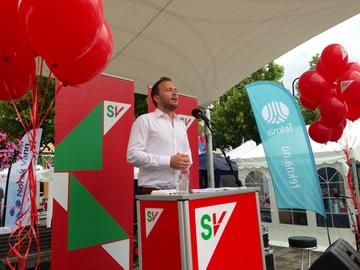Norway’s Socialist Left party (SV) is so worried about its poor showings in recent polls that it called in reporters to a crisis session on Sunday. With some polls showing support from just 2.5 percent of Norway’s voters, not even party leader Audun Lysbakken may retain his seat in parliament.

Lysbakken claims he’s not only worried about the future of his own party, which has been part of Norway’s left-center government coalition for the past eight years, but for the future of the left side of Norwegian politics in general, which is largely responsible for the country’s strong social welfare system that has ushered in such programs over the years as tuition-free university education, free hospitalization, the world’s most generous parental leave and labour-friendly workplaces.
“This isn’t just about which government the country will have, this is about whether Norway will become a country without a vigorous left side,” Lysbakken told reporters.
If SV lands under the level of voter support needed to claim seats in parliament, Norway may wind up with the first parliament without any socialists for 40 years, he said. There won’t be any forces to the left of the Labour Party, he warned, which many political analysts believe has become much more moderate and right-leaning in recent years.
Lost position while in position
SV was clearly much stronger and had more voter appeal before it finally won government power in Norway’s currently Labour-led left-center coalition in 2005. At that time, it had nearly 9 percent of the vote and had claimed higher numbers before that. Lysbakken thinks voters are focusing on the compromises SV has had to make to remain in the coalition, and underestimated the gains SV claims to have made.
“We’re the ones who have fought for the rights of vulnerable children, for the rights of women and for the fishing industry around Lofoten and Vesterålen,” Lysbakken said. He’s particularly proud of being able to help keep the oil companies out of the scenic area, at least for now, and worries that oil drilling will start up under a right- or center-right government, or any government without SV in parliament.
Rise of the greens
Many analysts link SV’s dive in voter popularity to the rise of the environmentally oriented party MDG (Miljøpartiet De Grønne), Norway’s version of a green party. MDG, it’s believed, has lured away voters who are most concerned with the environment with its radical environmental policies. Some polls show it with more than 3 percent of the vote, maybe even as much as 5 percent, and likely to take the parliamentary seats that SV has held.
Lysbakken warns that while MDG will also fight against oil exploration off Lofoten, it’s otherwise not a classic leftist party and instead will cooperate with whom it must to reduce consumption, restrict low-fare air travel and concentrate on self-sufficiency. He said he has respect for much of MDG’s ideas, but doesn’t think MDG has the same commitment to humanitarian and workplace issues as SV.
There is a chance, meanwhile, that the more radical left-wing party Rødt (the Reds) will win representation in parliament. It hasn’t been gaining in the polls as much as MDG and trails SV, but because of Norway’s complicated mandate system, its leader Bjørnar Moxnes may win a seat. The election is set for Monday September 9.
newsinenglish.no/Nina Berglund

